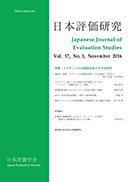Volume 17, Issue 1
Displaying 1-6 of 6 articles from this issue
- |<
- <
- 1
- >
- >|
Special Issue: Practical Use and its Direction of the Evidence
-
2016Volume 17Issue 1 Pages 1-2
Published: November 17, 2016
Released on J-STAGE: June 01, 2023
Download PDF (674K) -
2016Volume 17Issue 1 Pages 3-18
Published: November 17, 2016
Released on J-STAGE: June 01, 2023
Download PDF (2190K) -
2016Volume 17Issue 1 Pages 19-32
Published: November 17, 2016
Released on J-STAGE: June 01, 2023
Download PDF (1820K) -
2016Volume 17Issue 1 Pages 33-41
Published: November 17, 2016
Released on J-STAGE: June 01, 2023
Download PDF (1362K) -
2016Volume 17Issue 1 Pages 43-54
Published: November 17, 2016
Released on J-STAGE: June 01, 2023
Download PDF (1673K)
Article
-
2016Volume 17Issue 1 Pages 55-67
Published: November 17, 2016
Released on J-STAGE: June 01, 2023
Download PDF (1840K)
- |<
- <
- 1
- >
- >|
